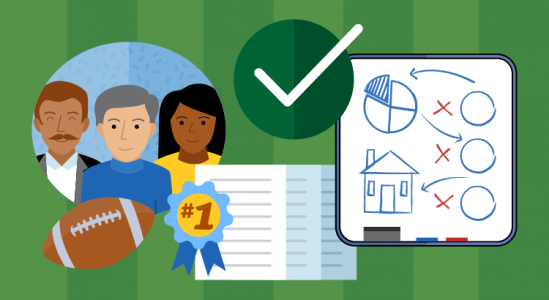Are you wondering what’s going on with home prices? Mortgage rates? Or asking yourself if…

GAMEPLAN: WHEN IS MORTGAGE INTEREST TAX DEDUCTIBLE?
DO YOU ITEMIZE YOUR TAX DEDUCTIONS?
You cannot take the mortgage interest deduction if you are taking the standard deduction. In 2022, the standard deduction is $12,950 for single taxpayers, $19,400 for heads of household, and $25,900 for married taxpayers filing a joint return. Please see a CPA for details.
IS YOUR HOME A “QUALIFIED RESIDENCE”?
Mortgage interest is only deductible if the mortgage is attached to a “qualified residence”. Taxpayers can generally deduct the mortgage interest on two qualified homes: one primary home and one vacation home.
IS YOUR MORTGAGE CLASSIFIED AS “ACQUISITION INDEBTEDNESS”?
Your mortgage or home equity line of credit is considered “acquisition indebtedness” if it was used to buy, build, or improve a qualified residence. Generally, you can deduct the interest on mortgage balances up to $750,000 of Acquisition Indebtedness. Here are two examples:
- Jane buys her $500,000 primary residence using a $400,000 mortgage. Jane would be able to deduct the interest on the $400,000 mortgage as acquisition indebtedness because (1) the mortgage was to buy a qualified residence; and, (2) the mortgage falls within the $750,000 limit.
- Janice buys her $500,000 primary residence with cash. A year later, Janice does a cash-out refinance and puts a $400,000 mortgage on the home. The funds are not used for home improvements. Janice would NOT be able to deduct the interest on the new $400,000 mortgage because the funds were not used to buy, build, or improve the house.
$1MM ACQUISITION DEBT LIMIT ON PRE-2017 LOANS.
Your acquisition debt limit is $1 million if you closed on your home loan prior to December 16, 2017, and the loan qualified as acquisition indebtedness at that time. You can keep that $1 million limit if you refinance that home loan as long as you do not increase the current balance on the loan. For example, if your current balance is $950,000, the new loan you’re refinancing into can’t be more than $950,000. This is also true when consolidating or refinancing a home equity loan or line of credit taken out prior to December 16, 2017, as long as you used that home equity loan to buy, build or improve a qualified residence. In that case, your combined aggregate total limit would be $1 million, whether you keep both loans separate, or whether you consolidate them into a single loan.
DISTINCTION BETWEEN A QUALIFIED RESIDENCE AND AN INVESTMENT PROPERTY.
Everything mentioned above pertains to a mortgage transaction involving a primary home or vacation home that is elected as a “qualified residence” for tax purposes. If your transaction involved an investment property, see IRS Publication 527.
PLEASE NOTE: THIS ARTICLE IS PROVIDED FOR INFORMATIONAL PURPOSES ONLY AND DOES NOT CONSTITUTE LEGAL, TAX, OR FINANCIAL ADVICE. PLEASE CONSULT WITH A QUALIFIED TAX ADVISOR FOR SPECIFIC ADVICE PERTAINING TO YOUR SITUATION. FOR MORE INFORMATION ON ANY OF THESE ITEMS, PLEASE REFERENCE IRS PUBLICATION 936.
$750,000
You can deduct the interest on mortgage balances up to $750,000.
(If you follow the rules outlined above.)


